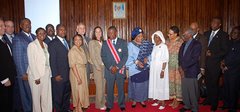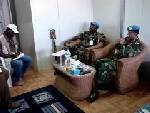

By Saliou Samb and Nick Tattersall
CONAKRY, Jan 20 (Reuters) - Violence triggered by a general strike spread to the remote south of Guinea on Saturday, killing at least three people as security forces clashed with protesters demanding an end to President Lansana Conte's rule.
Union leaders called the strike, which has paralysed the country for 11 straight days, saying Conte -- a reclusive diabetic in his 70s -- is unfit to govern and should step aside.
Riot police armed with rifles and tear gas have clashed with youths in the coastal capital Conakry and a dozen other towns in recent days, killing at least five people.
But Saturday's was the first unrest reported as far away as Nzerekore, more than 500 km (300 miles) south of the capital in the volatile forest region.
"The protesters went towards the prefect's residence to loot it. The resulting clash with soldiers killed three people and injured 12," Lamine Bangoura, a senior army officer and governor of Nzerekore, told Reuters by telephone.
Residents said several hundred protesters had marched into town, cutting down trees to block roads. A police station in the Boiro neighbourhood was looted and prisoners released.
The strike and the protests it has triggered pose the toughest challenge yet to Conte's 23-year rule and threaten to throw the former French colony into turmoil, diplomats and analysts say.
The region around Nzerekore is vulnerable because of its porous borders with Liberia, Sierra Leone and Ivory Coast, across which arms and fighters are smuggled with relative ease.
"There is mounting fear that a descent into violence may precipitate regional instability," Kissy Agyeman, Africa analyst at research group Global Insight, said in a note this week.
"Guinea borders Sierra Leone and Liberia, countries which are still reeling from the aftermath of civil conflict, so heightened insecurity in the country could have depredations across the region as a whole."
POLITICAL IMPASSE
With no obvious successor and a fractious military, Conte's ailing health has long caused fears of a violent struggle for power. Even factions within his own ruling elite vying to succeed him appear to be growing impatient, analysts say.
Strike leaders say Conte is too sick and erratic to rule, citing a spate of confused cabinet reshuffles and his intervention to free from jail two ex-allies accused of graft.
They want him to step aside and hand power to a new transitional prime minister agreed on jointly by the government, opposition, civil society and unions.
Even if such an agreement could be reached, diplomats doubt it would guarantee political stability for long.
"The option of a strong prime minister running the country, which lots of people talk about, has already failed twice because the prime minister hasn't been given the necessary powers," said one diplomat who asked not to be named.
Late on Friday, Conte dismissed his right-hand man, Fode Bangoura, minister in charge of presidential affairs and a powerful member of his ethnic Soussou clique, in an apparent concession to the unions.
The opposition said the move was not enough and vowed to continue the strike, which has interrupted bauxite production in the world's top producer of the ore.
Union leaders called the strike, which has paralysed the country for 11 straight days, saying Conte -- a reclusive diabetic in his 70s -- is unfit to govern and should step aside.
Riot police armed with rifles and tear gas have clashed with youths in the coastal capital Conakry and a dozen other towns in recent days, killing at least five people.
But Saturday's was the first unrest reported as far away as Nzerekore, more than 500 km (300 miles) south of the capital in the volatile forest region.
"The protesters went towards the prefect's residence to loot it. The resulting clash with soldiers killed three people and injured 12," Lamine Bangoura, a senior army officer and governor of Nzerekore, told Reuters by telephone.
Residents said several hundred protesters had marched into town, cutting down trees to block roads. A police station in the Boiro neighbourhood was looted and prisoners released.
The strike and the protests it has triggered pose the toughest challenge yet to Conte's 23-year rule and threaten to throw the former French colony into turmoil, diplomats and analysts say.
The region around Nzerekore is vulnerable because of its porous borders with Liberia, Sierra Leone and Ivory Coast, across which arms and fighters are smuggled with relative ease.
"There is mounting fear that a descent into violence may precipitate regional instability," Kissy Agyeman, Africa analyst at research group Global Insight, said in a note this week.
"Guinea borders Sierra Leone and Liberia, countries which are still reeling from the aftermath of civil conflict, so heightened insecurity in the country could have depredations across the region as a whole."
POLITICAL IMPASSE
With no obvious successor and a fractious military, Conte's ailing health has long caused fears of a violent struggle for power. Even factions within his own ruling elite vying to succeed him appear to be growing impatient, analysts say.
Strike leaders say Conte is too sick and erratic to rule, citing a spate of confused cabinet reshuffles and his intervention to free from jail two ex-allies accused of graft.
They want him to step aside and hand power to a new transitional prime minister agreed on jointly by the government, opposition, civil society and unions.
Even if such an agreement could be reached, diplomats doubt it would guarantee political stability for long.
"The option of a strong prime minister running the country, which lots of people talk about, has already failed twice because the prime minister hasn't been given the necessary powers," said one diplomat who asked not to be named.
Late on Friday, Conte dismissed his right-hand man, Fode Bangoura, minister in charge of presidential affairs and a powerful member of his ethnic Soussou clique, in an apparent concession to the unions.
The opposition said the move was not enough and vowed to continue the strike, which has interrupted bauxite production in the world's top producer of the ore.



No comments:
Post a Comment